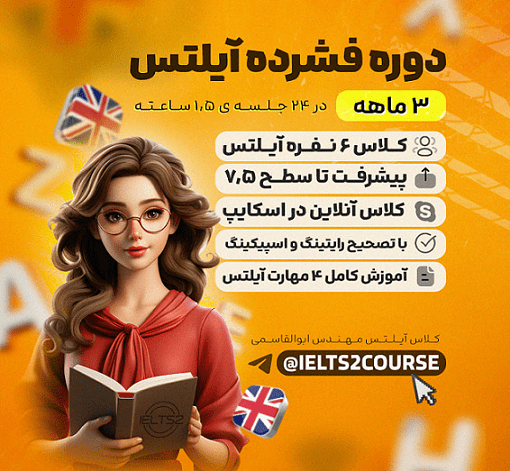آموزش لغات آیلتس برای موضوع کودکان
IELTS Vocabulary About Children
کودکان یکی از موضوعات رایج و مهم در آزمون آیلتس، به ویژه در بخشهای رایتینگ و اسپیکینگ هستند. شناخت واژگان و اصطلاحات مرتبط با موضوع کودکان میتواند به شما کمک کند تا پاسخهای دقیق تری در این آزمون ارائه دهید و نمره بالاتری کسب کنید. در این مقاله، به بررسی لغات ضروری و کاربردی برای موضوع کودکان در آزمون آیلتس خواهیم پرداخت. دانلود لغات ضروری ایلتس pdf پیشنهاد بعدی ما به شما عزیزان است.
20 ترکیب و لغات آیلتس درباره موضوع کودکان (Children)
1. Childhood (دوران کودکی)
تعریف: دورهای از زندگی انسان که از تولد تا حدود ۱۲ سالگی ادامه دارد.
مثال: “Many people believe that childhood is the happiest time of a person’s life.”
2. Infant (نوزاد)
تعریف: کودک در سنین زیر ۱ سال.
مثال: “Caring for an infant requires constant attention and patience.”
3. Toddler (کودک نوپا)
تعریف: کودک بین ۱ تا ۳ سال که تازه شروع به راه رفتن کرده است.
مثال: “Toddlers are very curious and love to explore their surroundings.”
4. Parenting (والدگری)
تعریف: فرآیند پرورش و تربیت کودکان توسط والدین.
مثال: “Good parenting involves teaching children values and discipline.”
5. Education (تحصیلات)
تعریف: فرآیند یادگیری و آموزش که در مدرسه یا خانه انجام میشود.
مثال: “Education plays a crucial role in a child’s development.”
6. Play (بازی)
تعریف: فعالیتهایی که کودکان برای سرگرمی و یادگیری انجام میدهند.
مثال: “Play is essential for children’s physical and mental development.”
7. Discipline (انضباط)
تعریف: آموزش و اصلاح رفتار کودکان با استفاده از قواعد و محدودیتها.
مثال: “Parents should find a balance between discipline and affection.”
8. Adolescence (دوران نوجوانی)
تعریف: دورهای از زندگی که کودکان به نوجوانی و سپس به بزرگسالی وارد میشوند.
مثال: “Adolescence is often a challenging time for both children and parents.”
9. Childcare (مراقبت از کودک)
تعریف: خدمات و فعالیتهایی که برای نگهداری و پرورش کودکان ارائه میشود.
مثال: “Childcare services are essential for working parents.”
10. Nurture (پرورش)
تعریف: پرورش و حمایت از رشد جسمی و روانی کودکان.
مثال: “Nurturing a child’s creativity is important for their development.”
11. Development (رشد)
تعریف: فرآیند رشد و پیشرفت جسمی و ذهنی کودکان.
مثال: “Physical and emotional development are equally important during childhood.”
12. Curiosity (کنجکاوی)
تعریف: میل به کشف و یادگیری چیزهای جدید که در کودکان بهطور طبیعی وجود دارد.
مثال: “Curiosity in children should be encouraged as it fosters learning.”
13. Imagination (تخیل)
تعریف: توانایی کودکان در تصور کردن چیزهایی که در دنیای واقعی وجود ندارند.
مثال: “Imagination plays a key role in children’s creativity.”
14. Early childhood education (آموزش کودکی)
تعریف: آموزشهایی که در سنین پایینتر، پیش از مدرسه، به کودکان داده میشود.
مثال: “Early childhood education lays the foundation for future learning.”
15. Peer pressure (فشار همسالان)
تعریف: تأثیری که همسالان روی تصمیمات و رفتار کودک دارند.
مثال: “Peer pressure can have both positive and negative effects on children.”
16. Moral values (ارزشهای اخلاقی)
تعریف: ارزشهایی که به کودکان کمک میکند تفاوت بین درست و غلط را تشخیص دهند.
مثال: “Parents should instill strong moral values in their children from a young age.”
17. Behavior (رفتار)
تعریف: طرز عمل یا واکنش کودکان به موقعیتها و شرایط مختلف.
مثال: “A child’s behavior is often a reflection of their upbringing.”
18. Learning disabilities (ناتوانیهای یادگیری)
تعریف: مشکلاتی که کودکان در یادگیری ممکن است داشته باشند.
مثال: “Some children may have learning disabilities that require special attention in school.”
19. Temperament (طبع)
تعریف: ویژگیهای شخصیتی که تعیینکننده واکنشهای احساسی و رفتاری کودک است.
مثال: “Every child has a different temperament, and it affects how they interact with others.”
20. Socialization (اجتماعیشدن)
تعریف: فرآیندی که کودکان از طریق آن تعامل با دیگران و رفتارهای اجتماعی را یاد میگیرند.
مثال: “Socialization with peers is important for a child’s emotional development.”
نکات عملی برای استفاده از لغات کودکان در آیلتس
1. استفاده لغات کودکان در اسپیکینگ آیلتس
در بخش اسپیکینگ آیلتس، ممکن است از شما درباره تجربیات دوران کودکی، روشهای تربیتی یا آموزش کودکان سوال شود. استفاده از این لغات به شما کمک میکند تا پاسخهای دقیق و روانتری ارائه دهید.
مثال: “In my opinion, play is a crucial part of a child’s development. Through play, children not only have fun but also learn important social and cognitive skills.”
2.
استفاده لغات کودکان در رایتینگ تسک 2
در بخش رایتینگ تسک 2، ممکن است موضوعات مربوط به اهمیت آموزش در دوران کودکی یا چالشهای مرتبط با تربیت کودکان مطرح شود. با استفاده از این لغات، میتوانید ایدههای خود را بهصورت شفاف و منظم بیان کنید.
مثال: “Early childhood education is essential for laying the foundation for future success. It helps children develop cognitive, social, and emotional skills that are critical for their academic and personal growth.”
سوالات پرتکرار اسپیکینگ آیلتس برای موضوع کودکان
- What are some important things that children should learn at an early age?
پاسخ: “At an early age, children should learn basic life skills, such as communication and problem-solving. They should also develop a sense of responsibility and respect for others.” - How can parents help their children succeed in life?
پاسخ: “Parents can help their children succeed by providing them with a supportive and nurturing environment. They should also encourage their children to explore their interests and develop a strong work ethic.” - What is the role of play in a child’s development?
پاسخ: “Play is crucial for a child’s development as it allows them to explore their creativity and imagination. It also helps them develop social skills, as they learn to interact with other children and work as part of a team.”
نمونه رایتینگ تسک 2 برای موضوع کودکان
Some people believe that parents should be responsible for teaching their children how to behave, while others think that schools are better suited for this task. Discuss both views and give your opinion.
The question of who is responsible for teaching children how to behave—parents or schools—is a topic of debate. While some argue that it is the role of parents, others believe that schools are better equipped to teach social behavior. In this essay, I will examine both perspectives and offer my opinion.
On the one hand, parents are the primary caregivers and play a crucial role in shaping their children’s behavior. From an early age, children look up to their parents as role models, and the lessons they learn at home form the foundation of their behavior. Parents have the responsibility to teach their children essential values such as respect, honesty, and kindness. Moreover, since children spend a significant amount of time with their parents, they are in a unique position to reinforce positive behaviors and correct negative ones.
On the other hand, schools also play a significant role in teaching children how to behave, especially in a social setting. Schools provide an environment where children interact with peers, teachers, and other staff members, which gives them the opportunity to practice social skills such as teamwork, communication, and conflict resolution. Furthermore, schools often have structured programs that focus on character development and instilling moral values in children, making them well-suited for teaching appropriate behavior.
In conclusion, both parents and schools have important roles to play in teaching children how to behave. While parents lay the foundation at home, schools provide the social context in which children can apply and refine these behaviors. Therefore, a collaborative effort between parents and schools is essential for raising well-behaved and socially responsible individuals.
سخن آخر
گلچینی از کلمات و لغات مهم آیلتس پیرامون موضوع کودکان همراه با مثال هایی برای پرتکرار ترین تاپیک های اسپیکینگ آیلتس را با هم در این صفحه بررسی کردیم. این آموزش از یکی از سایت های آموزشی مرجع آیلتس را در همین زمینه به شما عزیزان پیشنهاد میکنیم. ضمنا هر سوالی برای شما مطرح هست با در بخش کامنت ها در همین صفحه یا در گروه آموزش رایگان آیلتس ما در تلگرام حتما مطرح بفرمایید ❤️







